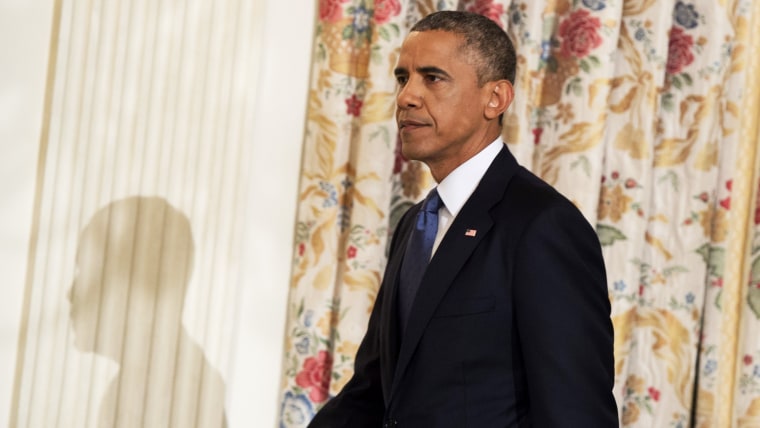President Obama issued a letter to House Speaker John Boehner late Friday "to keep the Congress fully informed" of his actions in Iraq and asking for support.
"As I announced publicly on August 7, 2014," the letter begins, "I have authorized the U.S. Armed Forces to conduct targeted airstrikes in Iraq. These military operations will be limited in their scope and duration as necessary to protect American personnel in Iraq by stopping the current advance on Erbil by the terrorist group Islamic State of Iraq and the Levant and to help forces in Iraq as they fight to break the siege of Mount Sinjar and protect the civilians trapped there."
In the letter, Obama also tells Congress that he authorized humanitarian aid "limited to supporting the civilians trapped on Mount Sinjar."
Obama justifies these actions to Congress, saying they "are in the national security and foreign policy interests of the United States" and explains that they "are being undertaken in coordination with the Iraqi government."
The U.S. military launched multiple airstrikes against Sunni militants in northern Iraq on Friday, according to the Pentagon, the first just hours after President Obama announced he had authorized targeted strikes to protect American assets and religious minorities threatened by members of the Islamic State of Iraq and Syria (ISIS).
Warplanes continued to attack ISIS targets on Friday near the city of Erbil, where the United States has a consulate and dozens of State Department and military personnel.
The first strike, carried out by two Navy FA-18's at 6:45 a.m. EDT, destroyed artillery used by ISIS forces, the Pentagon said. Shortly after 10 a.m., drone aircraft hit another terrorist mortar position, striking twice in quick succession before eliminating the target. A third strike at approximately 11:20 a.m. destroyed an ISIS convoy of seven vehicles and a mortar position in two bombing runs by four F-18 aircraft.
"The fact of the matter is we have people in Erbil, and if ISIS is allowed to advance any more towards Erbil, we believe it could put the city at risk; that puts our people at risk," Deputy National Security Adviser Ben Rhdoes told msnbc's Chuck Todd Friday. Rhodes said the U.S. has an "invitation from the Iraqi government to take this action."
ISIS, which launched as an offshoot of al-Qaeda, is a Sunni militant group seeking to create a new state in the region under Sharia law. It controls territory from northern Syria to the northern parts of Iraq.
Rhodes added that ISIS advances toward Baghdad and threatens American personnel, U.S. military action could follow there. White House press secretary did not say whether additional airstrikes were in motion Friday afternoon, adding that the Department of Defense would provide updates on any additional strikes.
President Obama announced Thursday evening that the U.S. had carried out a humanitarian mission to deliver food and water to religious minorities stranded on a mountain in northern Iraq. Tens of thousands of civilians were forced to flee Mosul, in northern Iraq, or face execution by ISIS forces if they didn't convert to Islam. Forty children from the group have died, according to UNICEF. Obama said he believed the religious minorities faced the threat of genocide.
"When many thousands of innocent civilians are faced with the danger of being wiped out, and we have the capacity to do something about it, we will take action,” Obama said at the White House. “That is our responsibility as Americans. That’s a hallmark of American leadership. That’s who we are.”
The president also said he had authorized “targeted military strikes” against ISIS militants if they were needed to protect U.S. personnel in the country.
“The decision to strike was made by the U.S. Central Command commander under authorization granted him by the commander-in-chief," Pentagon press secretary Rear Adm. John Kirby said in a statement Friday. “As the president made clear, the United States military will continue to take direct action against [ISIS] when they threaten our personnel and facilities.”
Earnest added Obama was "determined" to use military force to protect U.S. personnel in Iraq and also to ensure "America isn't dragged back into a prolonged military conflict" there. He added there is not "a timeline I can share right now" on the length of the military campaign.
The State Department's press briefing got heated Friday as several reporters pressed for more information about the timing of the attack.
The U.S. took action this week because it "believed there was a crisis that had the potential to get much worse. We were asked by the Iraqi government to come in and help when they could not do it themselves," State Department spokesperson Marie Harf said, adding that there is currently a "discreet, dire humanitarian situation" in Iraq.
Harf reiterated the president's statement that the U.S. cannot provide a long-term solution to the crisis in Iraq.
"We can't be doing this forever," Harf said. "There is no long-term American military solution to this problem."
Benjamin Landy and Michele Richinick contributed reporting.
